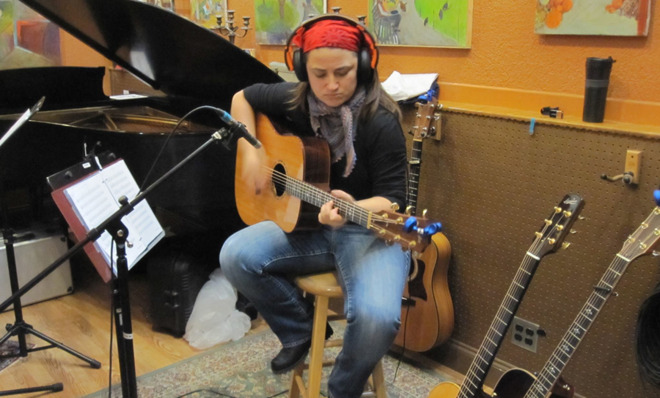Is the Christian music industry liberalizing on gay marriage?
The arts have long been at the vanguard of social change. But when that art is Christian, theology plays a strong role, too.


A free daily email with the biggest news stories of the day – and the best features from TheWeek.com
You are now subscribed
Your newsletter sign-up was successful
Does it matter if the lyrics you sing to worship God were written by someone with whom you have deep theological disagreements?
Christian rock star Vicky Beeching forced her fans to confront this question last week when she told The Independent that she is a lesbian. Her songs are among the most commonly sung in North American churches. But many within her Christian fan base believe gay sex and marriage are sinful.
Beeching has shared harrowing stories of struggling to shirk her sexuality. She even recounts participating in a traumatic exorcism at a Christian youth camp. Nineteen years after the failed attempt to purge the gay-ness from her spirit, Beeching chose to just be open and honest about who she believes she is.
The Week
Escape your echo chamber. Get the facts behind the news, plus analysis from multiple perspectives.

Sign up for The Week's Free Newsletters
From our morning news briefing to a weekly Good News Newsletter, get the best of The Week delivered directly to your inbox.
From our morning news briefing to a weekly Good News Newsletter, get the best of The Week delivered directly to your inbox.
"Old habits die hard," Beeching told me via email. "I'm finally free from guilt and shame, but it's been a very long road to get here."
Beeching isn't the first major faith-filled musician to come out of the closet or change his or her views. Many in the Christian music industry — like their book publishing counterparts — appear to be slowly and quietly shifting on the issue of gay marriage. This is a formative moment when many Christians are reconsidering the traditional understanding of sexuality and marriage. And popular leaders within the Christian music industry could accelerate a broader swing.
The shift began in 2004, when Christian musician Ray Boltz, whose songs had become staples in evangelical churches and Christian conferences, came out as gay. Then, in 2009, the Grammy-nominated Anthony Williams (stage name: Tonex) became the first openly gay gospel artist. In 2010, Christian singer Jennifer Knapp came out as a lesbian.
Knapp plans to speak at length about her experience in a memoir, Facing the Music, scheduled for release in October. The Grammy-nominated artist's book promises to recount "her years of trying to come to terms with her sexual orientation" and how she became "an advocate for LGBT issues in the church." (After early news reports of the book's development surfaced, the subtitle was softened from "Discovering Real Life, Real Love and Real Faith" to "My Story.")
A free daily email with the biggest news stories of the day – and the best features from TheWeek.com
Knapp's book is endorsed by Dan Haseltine, the lead singer for Christian rock band Jars of Clay, who created a stir in April when he tweeted his support of same-sex marriage.
"I just don't see a negative effect to allowing gay marriage," he tweeted, adding that he thinks most people interpret scripture incorrectly, and that this "has left room for people to deal inhumanly and unlovingly toward others that don't fit their guidelines."
Haseltine — whose band has won three Grammy awards and sold more than five million records — later apologized for creating controversy but stood by his position on gay marriage.
Matthew Paul Turner, former editor of Contemporary Christian Music magazine and author of Our Great Big American God, told me he supports gay marriage and voted against Tennessee's marriage amendment. He says he does not believe that homosexual behaviors are sinful and, though he admits that he could be wrong, says, "I'd much rather be wrong and pursue grace and open acceptance than right and arrogant and cruel."
Other Christian musicians have been less willing to plant their flags on either side but have still signaled subtle shifts from traditional Christian postures and rhetoric.
Derek Webb won three Dove Awards, scored six No. 1 Christian radio hits, and sold nearly 1 million records as a member of Caedmon's Call. While he's shied away from talking explicitly about his positions on sexuality, Webb toured recently with Knapp. His record label, INO, refused to release one of the songs on his Stockholm Syndrome album, which was reportedly "a scathing critique of how evangelicals approach homosexuality."
Grammy winner Amy Grant may be another waffler. Though Grant also hasn't defined her position on the matter, she conducted her first interview with the gay press in 2013, indicating that meeting LGBT people on tour has caused her to rethink things. "I've have had so many occasions in my life where I have felt really strongly about something — but that feeling has changed," Grant said. She added, "The journey of faith is just being willing and open to have a relationship with God. And everybody is welcome. Everybody.”
Grant cut her teeth as a Christian singer known for hits such as "El Shaddai" and "Thy Word." After a successful secular pop career, she has re-entered the Christian market. Grant holds the record for most No. 1s in Christian music history.
But Beeching's position may prove to be more impactful than any of the others. A 35-year-old Brit and Oxford-educated theologian, Beeching saw her star rise in recent years as a regular commentator on the BBC and Sky News. Unlike Knapp or Boltz, her songs are more suited to corporate worship than Sunday solos. Hundreds of thousands of congregants praise God in American churches through her compositions each month.
Still, everyone in the Christian music industry who takes a liberal position has much to risk. After all, those people's incomes are based on licensing, royalties, and book sales. If Christians don't sing their songs or purchase their products, these artists' stances on gay marriage could cost them their careers. Their futures are now in the hands of the fans who must decide whether such beliefs are in harmony or out of tune.
Jonathan Merritt is author of the book Learning to Speak God from Scratch: Why Sacred Words are Vanishing — and How We Can Revive Them and a contributing writer for The Atlantic.
-
 The Olympic timekeepers keeping the Games on track
The Olympic timekeepers keeping the Games on trackUnder the Radar Swiss watchmaking giant Omega has been at the finish line of every Olympic Games for nearly 100 years
-
 Will increasing tensions with Iran boil over into war?
Will increasing tensions with Iran boil over into war?Today’s Big Question President Donald Trump has recently been threatening the country
-
 Corruption: The spy sheikh and the president
Corruption: The spy sheikh and the presidentFeature Trump is at the center of another scandal
